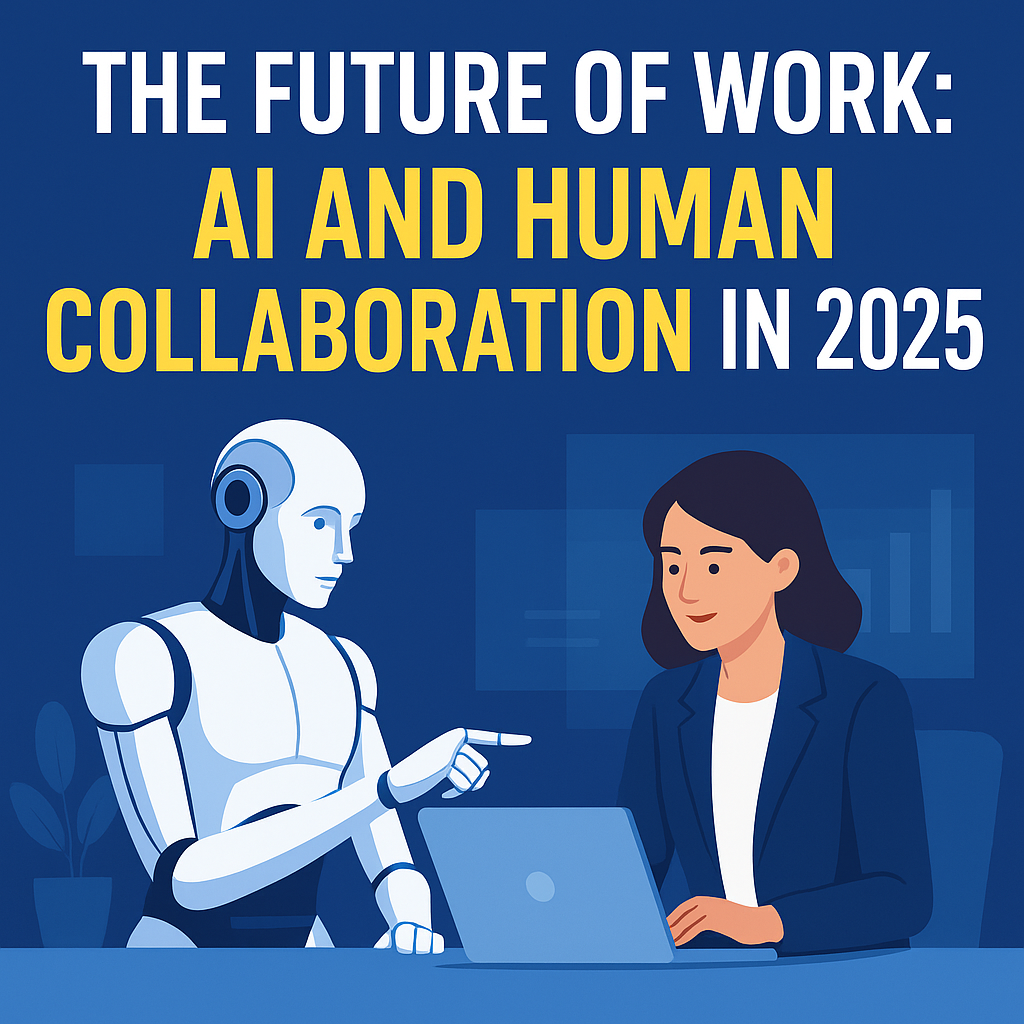
Introduction
The world of work is undergoing one of the most transformative shifts in history. Just like the industrial revolution changed the 19th century and the internet reshaped the late 20th century, artificial intelligence (AI) is rewriting the rules of productivity, employment, and collaboration in the 21st century.
In 2025, we are no longer asking, “Will AI take my job?” Instead, the new question is, “How can humans and AI work together to achieve more?”
AI isn’t replacing people; it’s becoming our partner — a powerful tool that, when used effectively, makes us more efficient, creative, and capable than ever before. In this article, we’ll explore the future of work with AI in 2025, how businesses are adapting, the challenges ahead, and the opportunities for individuals to thrive in this new era.
How AI is Transforming Workplaces
AI tools are now present in nearly every industry. From healthcare to education, from finance to agriculture, AI-powered systems are making tasks faster and more accurate. Let’s look at the most important areas where AI is shaping the workplace:
- Automation of Repetitive Tasks
One of AI’s biggest strengths is handling repetitive, time-consuming tasks. For instance:
Customer service teams now use AI chatbots to handle basic queries.
HR departments use AI to scan resumes and shortlist candidates.
Finance teams rely on AI to detect fraud and manage bookkeeping.
This automation allows employees to focus on higher-value tasks like strategy, problem-solving, and human interaction.
- Decision-Making with Data
Businesses today are swimming in data, but humans can’t analyze it all quickly. AI provides insights in seconds:
Retail companies use AI to forecast sales trends.
Doctors use AI-powered systems to predict diseases earlier.
Marketers use AI to analyze customer behavior and design targeted campaigns.
This shift is creating a workplace where decisions are data-driven rather than based on assumptions.
- Boosting Productivity
AI-powered apps like Notion AI, Grammarly, and ChatGPT help professionals write reports, generate content, and brainstorm ideas faster. For example:
A lawyer can draft contracts more quickly using AI templates.
A teacher can design personalized lesson plans for students.
A student can summarize research papers instantly.
The result? More productivity in less time.
The Human Side of AI: Why Collaboration Matters
Despite all these benefits, AI cannot replace human qualities like creativity, emotional intelligence, and ethical judgment. The future of work is not AI versus humans; it’s AI with humans.
Here’s why collaboration matters:
- Creativity and Innovation
AI can analyze patterns, but it can’t “imagine” like humans. Writers, designers, and entrepreneurs are using AI tools to speed up the creative process, but the spark of originality still comes from people.
- Emotional Intelligence
Jobs that involve empathy — such as nursing, teaching, counseling, and leadership — cannot be fully automated. AI may provide data, but humans bring the human touch that builds trust and connection.
- Ethics and Responsibility
AI can recommend decisions, but only humans can judge what’s morally right. For example, in healthcare, an AI system might recommend the most effective treatment, but a doctor considers both medical and emotional factors before choosing.
The Future of Jobs: Will AI Replace or Create Jobs?
This is the most debated question around AI. Studies show that while AI will replace certain jobs, it will also create new types of roles.
Jobs Being Transformed:
Data Entry Clerks → Automated by AI.
Customer Service Agents → Replaced in basic queries by chatbots.
Manufacturing Workers → Machines handle repetitive tasks.
Jobs Being Created:
AI Trainers → People who train AI models to understand human behavior.
Ethical AI Specialists → Professionals ensuring AI is used responsibly.
AI-assisted Creatives → Writers, artists, and musicians who use AI as a tool to scale their creativity.
Prompt Engineers → Experts in crafting the right inputs for AI systems.
So instead of eliminating jobs, AI is reshaping job roles and demanding new skills.
Key Skills Needed in the Future of Work
If you want to thrive in this AI-driven world, you need to focus on upskilling. Here are the most in-demand skills for 2025 and beyond:
- AI Literacy – Understanding how AI works and how to use it effectively.
- Critical Thinking – Analyzing AI’s suggestions instead of blindly trusting them.
- Creativity – Using AI as a tool, not a replacement, for innovation.
- Emotional Intelligence – Skills like empathy, communication, and leadership.
- Digital Collaboration – Working seamlessly with both humans and AI systems.
Workers who combine these skills will be in high demand in every industry.
Challenges of AI in the Workplace
The future of work with AI isn’t without problems. Some major challenges include:
Job Displacement Fears: Some workers are worried about losing their jobs.
Bias in AI: If AI is trained on biased data, it can lead to unfair outcomes.
Privacy Concerns: AI tools handle massive amounts of personal data.
Over-reliance on AI: Businesses may become too dependent on machines.
The solution lies in responsible adoption of AI — ensuring workers are retrained, data is protected, and humans stay in control of decision-making.
How Businesses Can Prepare for the Future of Work
- Invest in Training Programs: Companies should upskill employees in AI literacy.
- Adopt Human-Centered AI: AI should support humans, not replace them.
- Encourage Collaboration: Teams should learn how to work with AI tools.
- Ensure Ethical Use: Businesses must adopt AI responsibly and transparently.
By doing this, companies will not only increase productivity but also build a workforce that feels empowered, not threatened, by AI.
Conclusion
The future of work in 2025 is not about humans competing with machines. Instead, it’s about partnership. AI handles the repetitive, data-heavy tasks, while humans focus on creativity, empathy, and ethical decision-making.
If individuals embrace AI as a tool — and if businesses implement it responsibly — the future workplace will be more innovative, productive, and human-centered than ever before.
The truth is clear: the future of work with AI is not about replacement, but about collaboration.